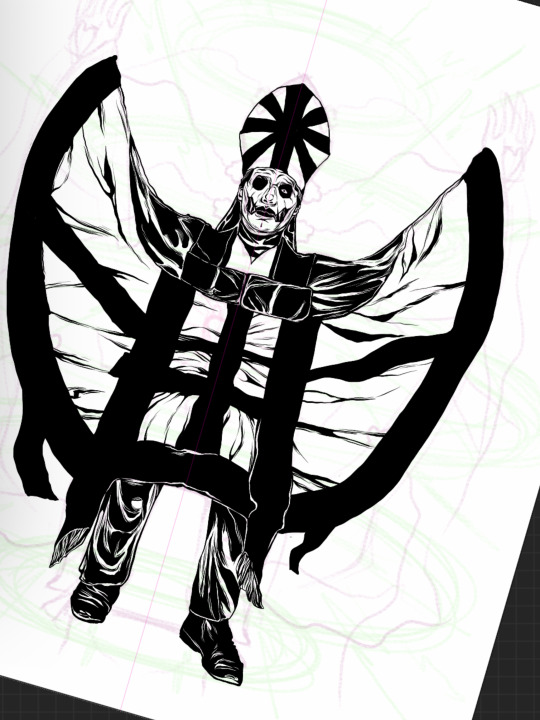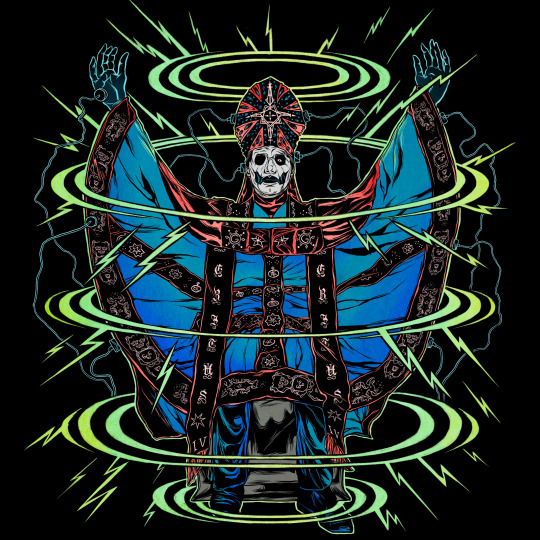#ubermensch
Text
The Philosophy of Undertale
Originally posted December 1st, 2015
Fortuna, Will to Power, and DETERMINATION

So, if you haven’t played Undertale, this is part of the article where I join the hype train and tell you that you should. It’s a fun and relatively short role playing game that’s fantastically written, and it’s also one of the funniest games I’ve ever played. The greatness of Undertale goes beyond humor though; it also serves as a critique of the Machiavellian notion of conquering Fortuna and the Nietzchean Ubermensch.
Spoiler Alert: This article spoils all three of the three possible endings of the game, so if you haven’t played through them yet, you should probably do that first.
Now, before we dive into Undertale, let me refresh your memory on what that philosophical jargon means. In his writing, Machiavelli attempts to dismantle the ancient understanding of Fortuna, or the idea that humankind’s best efforts will always be limited by our circumstances. Machiavelli didn’t believe that Fortuna was something that people had to accept, and so he argued for the conquering of Fortuna through force, with The Prince being a guide for how a ruler is to overcome Fortuna.
At the core of Nietzchean philosophy is the concept of the “Ubermensch,” or the “Overman.” The Ubermensch is a man who exerts his will to power over all those around him, dominating them so that they serve his purposes. Nietzsche came up with the Ubermensch in response to Modernism’s failure to prove the existence of an objective morality, and conceptually, the Ubermensch represents the idea that in the absence of objective morality, all that matters is how much stronger one person’s “will to power” is compared to another’s (or to paraphrase Plato, justice becomes the advantage of the stronger).

Getting back to Undertale, Machiavelli’s concept of Fortuna is represented through the concept of DETERMINATION, which your character is filled with anytime they visit a save point in the game. You discover at the end of the Genocide route that DETERMINATION is what allows you to reset your timeline to your last save, and you have a conversation with Flowey, who used to be able to reset time in this way before your character came along. This ability to reset time is the ultimate method of conquering Fortuna, but the game shows the negative consequences of this ability when it tells us Flowey’s story.
Flowey was a flower injected with DETERMINATION by Alphys, the royal scientist, and it came to life after being injected. This flower contained part of Asriel’s soul, a monster who was the prince of the underground, and he was brought back to life as a sentient flower. Flowey was rejected by his mother and father, Toriel and Asgore, and his isolation led him into a deep depression, causing him to commit suicide.
But as Flowey neared the brink of death, he realized that he didn’t want to die, and then he reappeared back at the beginning of his life as a flower. He then realized that he could reset his own timeline by bringing himself to the brink of death, and after a while, he began to use his ability to manipulate people. His ability to completely conquer Fortuna led him to a state of moral depravity, and he lost the ability to see people as anything but tools for his personal gain.

The Nietzschean Ubermensch is also shown through DETERMINATION, as the ultimate realization of the Overman’s potential. Nietzsche’s Ubermensch was able to overcome most human limitations through his will to power, but even he couldn’t overcome death. DETERMINATION allows your character to persist beyond even death, and when combined with your character’s domination over the lives of the monsters on the Genocide route, your character becomes an Ubermensch beyond what Nietzsche could have believed possible.
Of course, this is not without its costs; at the end of the genocide route, it is revealed that your character has been playing into the schemes of another since the beginning. Their name is Chara, and ever since they died in the underground, they have been plotting their revenge. By going through the underground and killing every single monster, you help realize their scheme, and after destroying the underground, they are released.
Chara then confronts you with a question: do you want to destroy the entire world? Of course, if you tell Chara that you don’t want to destroy the world, they will reveal that you have long since forfeited that option. The only choice Chara leaves for you is the option to reset your timeline, and proceed through the underground once more, as Chara respects the strange sentimentality you hold towards the world. (Interestingly, even Chara, the embodiment of destruction, suggests that you take a different path, as it might be better for you).

DETERMINATION, and its associated will to power beyond death, has other negative effects as well, which are seen in the True Lab along the Pacifist route. In the true lab, you discover that Alphys has been performing experiments with DETERMINATION, injecting it into monsters so that they might persist beyond death as well.
In the lab, you see that DETERMINATION is actively harmful to a monsters being, causing them to physically melt, with some melting together to become Amalgamates. The monsters, who throughout the game are shown to be very kind and nonviolent, cannot exist alongside DETERMINATION, and in this way, Undertale makes its final critique of Nietzschean morality: the will to power is actively destructive towards kindness, generosity, and goodness, and it is impossible for these things to exist within Nietzsche’s amoral framework.
*Flowey/Asriel is able to survive containing DETERMINATION because of Asriel’s soul bonding with the flower that was injected. The flower’s physical form is stronger than a monster’s body, and so DETERMINATION will not destroy it.
#undertale#asriel#chara#frisk#asgore#toriel#nietzche#frederick nietzsche#machiavelli#niccolo machiavelli#ubermensch#will to power#fortuna#determination#you know what#i like this piece better than i expected#it is a bit jargon heavy#and you have to be familiar with machiavelli and nietzsche to follow#but it is a cogent analysis of what undertale is doing philosophically#as it is genuinely engaged in critiques of these ideas
36 notes
·
View notes
Text
Embracing Nietzschean Philosophy: Exploring "Thus Spake Zarathustra"

Friedrich Nietzsche's "Thus Spake Zarathustra: A Book for All and None" is a profound and provocative work that challenges conventional beliefs and invites readers to reexamine their values and assumptions about life, morality, and the human condition. Originally published in 1883, this philosophical masterpiece explores themes such as the death of God, the eternal recurrence, the will to power, and the Ubermensch (or "overman"), presenting Nietzsche's vision of a new way of thinking and living in the modern world.
At the heart of "Thus Spake Zarathustra" is the character of Zarathustra, a fictionalized version of the ancient Persian prophet Zoroaster, who descends from his mountain retreat to share his wisdom with humanity. Through a series of discourses, parables, and aphorisms, Zarathustra challenges his listeners to transcend their limitations, embrace their innermost desires, and strive for self-mastery and self-overcoming. Nietzsche's use of allegory and metaphor imbues the text with richness and depth, inviting readers to engage with its philosophical themes on multiple levels.
One of the most striking features of "Thus Spake Zarathustra" is its lyrical and poetic style, which sets it apart from Nietzsche's more academic works. Translated by Thomas Common, the text retains much of its original beauty and power, capturing Nietzsche's philosophical insights with clarity and elegance. Common's translation allows readers to immerse themselves in Nietzsche's thought-provoking ideas and experience the full force of his rhetorical flourishes and linguistic innovations.
Moreover, "Thus Spake Zarathustra" is notable for its critique of traditional morality and religion, which Nietzsche argues have stifled human potential and constrained individual freedom. Through Zarathustra's teachings, Nietzsche advocates for a radical revaluation of all values, urging readers to embrace a more expansive and life-affirming ethos that celebrates creativity, authenticity, and self-expression. Nietzsche's rejection of conventional norms and his embrace of existential freedom continue to resonate with readers today, inspiring countless individuals to question authority and forge their own path in life.
In addition to its philosophical depth and literary merit, "Thus Spake Zarathustra" has had a profound impact on art, literature, and culture, influencing thinkers such as Sigmund Freud, Carl Jung, and Friedrich Engels, as well as artists, musicians, and writers from around the world. Its themes of self-discovery, self-transcendence, and the pursuit of meaning continue to inspire and challenge readers to this day, making "Thus Spake Zarathustra" a timeless classic that speaks to the eternal quest for wisdom and self-realization.
In conclusion, "Thus Spake Zarathustra: A Book for All and None" by Friedrich Nietzsche, translated by Thomas Common, is a thought-provoking and intellectually stimulating work that continues to captivate readers with its profound insights, poetic language, and revolutionary ideas. Nietzsche's vision of the Ubermensch and his call to embrace the fullness of life remain as relevant today as they were when the book was first published, offering a powerful antidote to the nihilism and despair of the modern age.
Friedrich Nietzsche's "Thus Spake Zarathustra: A Book for All and None" is available in Amazon in paperback 23.99$ and hardcover 29.99$ editions.
Number of pages: 471
Language: English
Rating: 11/10
Link of the book!
Review By: King's Cat
#Thus Spake Zarathustra#Friedrich Nietzsche#Philosophy#Existentialism#Ubermensch#Overman#Will to power#Nihilism#Death of God#Eternal recurrence#Morality#Individualism#Self-overcoming#Self-mastery#Transcendence#Human condition#Spiritual liberation#Life affirmation#Existential freedom#Philosophy of life#Ethics#Individual autonomy#Nietzschean philosophy#Self-discovery#Self-realization#Human potential#Radical revaluation#Authenticity#Self-expression#Literary classic
2 notes
·
View notes
Text

#Nietzsche#Friedrich Nietzsche#Beyond Good and Evil#Beyond Naughty and Nice#Christmas#Santa Claus#Ubermensch#eternal recurrence#ressentiment#philosophy#German philosophy#moustache#Hegel#Foucault#Habermas#Ho Ho Ho#Continental philosophy#Genealogy#Gay Science#Zarathustra#pun#Penguin Classics#penguins#naughty#nice
33 notes
·
View notes
Text
“Yes, one can wager war in this world, ape love, torture one’s fellow man, or merely say evil of one’s neighbor while knitting. But, in certain cases, carrying on, merely continuing, is superhuman.”
Albert Camus, The Fall
https://bookshop.org/a/12010/9780679720225
#War#love#torture#man#judge#judgement#humanity#carry on#carrying on#superhuman#superman#ubermensch#albert camus#The Fall#booklr#bookblr#bookish#bookworm#booklover#bibliophile#book#books#philosophy#books and libraries#book quote#book quotes#literary quote#literary quotes#great quote#great quotes
6 notes
·
View notes
Text

27 notes
·
View notes
Quote
I'm intrigued by people who aren't afraid to break free from conventions, by people who march to the beat of their own drum, by people who exit echo chambers, by lone wolves who pave their own path instead of following herds that repeat the same things, by people who transcend superficial hierarchies.
Lady Macabre Beth
#intp#ubermensch#lonewolf#loner#lonerspath#nonconformist#Nietzsche#superman#independent#independence#Aries#misunderstood#alienation#different#unique#superhuman#albertcamus#thestranger
54 notes
·
View notes
Text



Machina and the Übermensch
For Ghost
16 notes
·
View notes
Text
"and once you're AWAKE you shall remain awake eternally"
-Friedrich Nietzsche
#philosophy#nietzsche#frederick nietzsche#awakening#suffering#life#live#truth#literature#wake up#existence#pain#ubermensch#symbols#book#misanthropy#bookblr#escapism#nihilism#nihilism sucks
12 notes
·
View notes
Video
youtube
NIETZSCHE'S WARNING: Ubermensch vs Last Man
5 notes
·
View notes
Text
the uberdoggy also known as: my dog
2 notes
·
View notes
Text
THE LINE THEY FEED YOU
“Man is a rope stretched between the animal and the Overman — a rope over an abyss.” — Friedrich Nietzsche
This three-part image (with this two-part text) shows some predators, some prey, and someone trying to be neither. It seems to be getting worse for the last type, but maybe that’s not new, though. It sure seems like their habitats are shrinking, and worse, their means of survival—trust—is…

View On WordPress
#capitalism#demosthenes#eat or be eaten#game theory#last men#Nietzsche#predatory entrepreneurs#Sartre#toxic people#transactional#trust#ubermensch#yeats
3 notes
·
View notes
Quote
Zarathustra spake thus unto the people:
I TEACH YOU THE SUPERMAN. Man is something that is to be surpassed. What have ye done to surpass man?
All beings hitherto have created something beyond themselves: and ye want to be the ebb of that great tide, and would rather go back to the beast than surpass man?
What is the ape to man? A laughing-stock, a thing of shame. And just the same shall man be to the Superman: a laughing-stock, a thing of shame.
Ye have made your way from the worm to man, and much within you is still worm. Once were ye apes, and even yet man is more of an ape than any of the apes.
Even the wisest among you is only a disharmony and hybrid of plant and phantom. But do I bid you become phantoms or plants?
Lo, I teach you the Superman!
Friedrich Nietzsche, Thus Spake Zarathustra, Prologue
1 note
·
View note
Text
“Yakmak istemelisin kendini kendi alevlerinde: Nasıl yeniden doğabilirsin ki önce kül olmadıysan?
Ey yalnız kişi, yaratıcının yolunda yürürsün: Bir Tanrı yaratmak istersin sen kendine, yedi şeytanından.”
Böyle Buyurdu Zerdüşt, Friedrich Nietzsche, Sayfa 91.
#böyle buyurdu zerdüşt#friedrich nietzsche#nietzschequotes#alıntı#kitapalintisi#ubermensch#thus spoke zarathustra#edebiyat
5 notes
·
View notes

